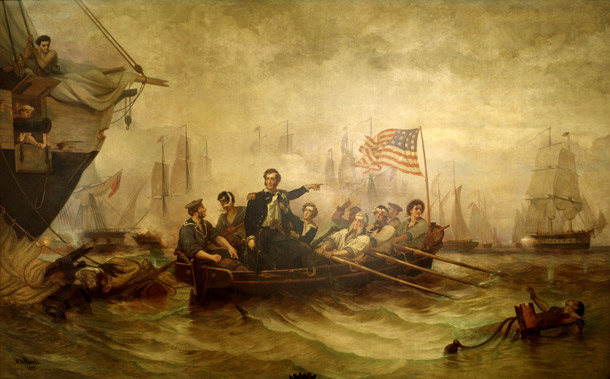Oliver Hazard Perry’s stunning victory on Lake Erie had far-reaching effects, sounding a death knell for Tecumseh’s dreams of establishing an Indian confederacy.
"We have met the enemy and they are ours." Commodore Oliver Hazard Perry, September 10, 1813

William Henry Powell, 1872, United States Capitol
In the western Canadian theater of the War of 1812, control of Lake Erie was vital to the supply of British forces stationed along the Detroit River. The ensuing struggle between the United States and Britain for control of this lifeline redefined the war’s stakes, leading to one of the most remarkable engagements in naval history and to the collapse of Shawnee leader Tecumseh’s strategic aspirations.
From the beginning of the war, the British dominated Lake Erie, but in the spring of 1813, American commander of naval forces on the lake, Oliver Hazard Perry, arrived to challenge British supremacy. Perry established a base at Presque Isle, Pennsylvania, and his crew of shipbuilders frenetically built a fleet of American warships from scratch.
By mid-summer, Perry was ready to launch his flotilla, but that required floating his vessels one by one over a formidable sandbar, leaving them vulnerable to attack. The British commander on Lake Erie, Robert Barclay, knew that and established a blockade offshore, but for reasons historians do not understand, Barclay lifted the blockade. With that chance opportunity, Perry launched the ships Lawrence and Niagara, using pontoons to raise them over the sand. After Perry launched his first ship, Barclay reappeared, but luckily for Perry and the Americans, Barclay hurried off, hoping to get one of his own newly built ships underway.
The ensuing naval engagement was ferocious. Perry’s flagship, the Lawrence, was badly damaged, and his crew suffered 80 percent casualties. Perry abandoned ship and rowed to the largely unscathed Niagara to resume the fight. Ultimately, Perry’s counterblows forced Barclay to surrender his entire squadron— something that had never happened in British naval history. After the battle, Perry sent his famous dispatch to Major General William Henry Harrison: “We have met the enemy and they are ours. Two ships, two brigs, one schooner and one sloop.”
Perry’s lucky and extraordinarily brave actions altered the balance of power in the West: the loss of the British squadron paved the way for General Harrison’s autumn invasion of Canada along the Detroit River.
The battle had other ramifications as well. British General Henry Procter’s decision to retreat enraged his ally Tecumseh, who vowed to stay and fight. It was a fateful move for the Shawnee leader: he would be killed in October 1813 at the Battle of the Thames. His death dashed visions of a pan-Indian confederacy that might have held the line against American westward expansion.
Last updated: May 24, 2016
